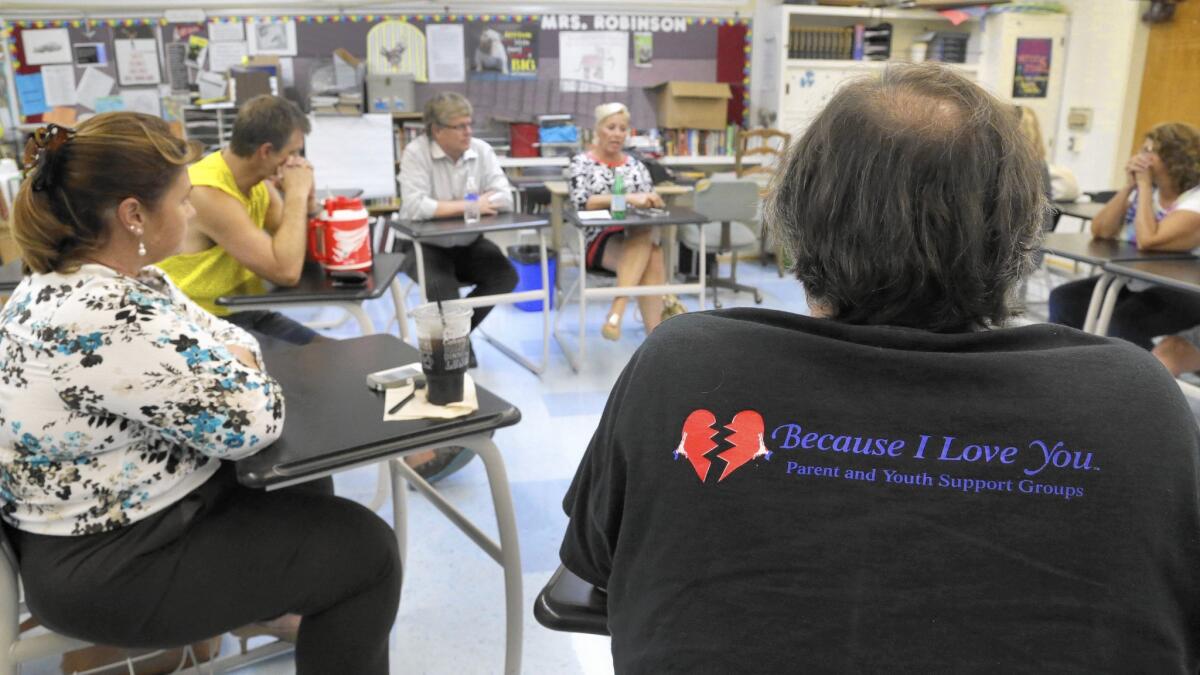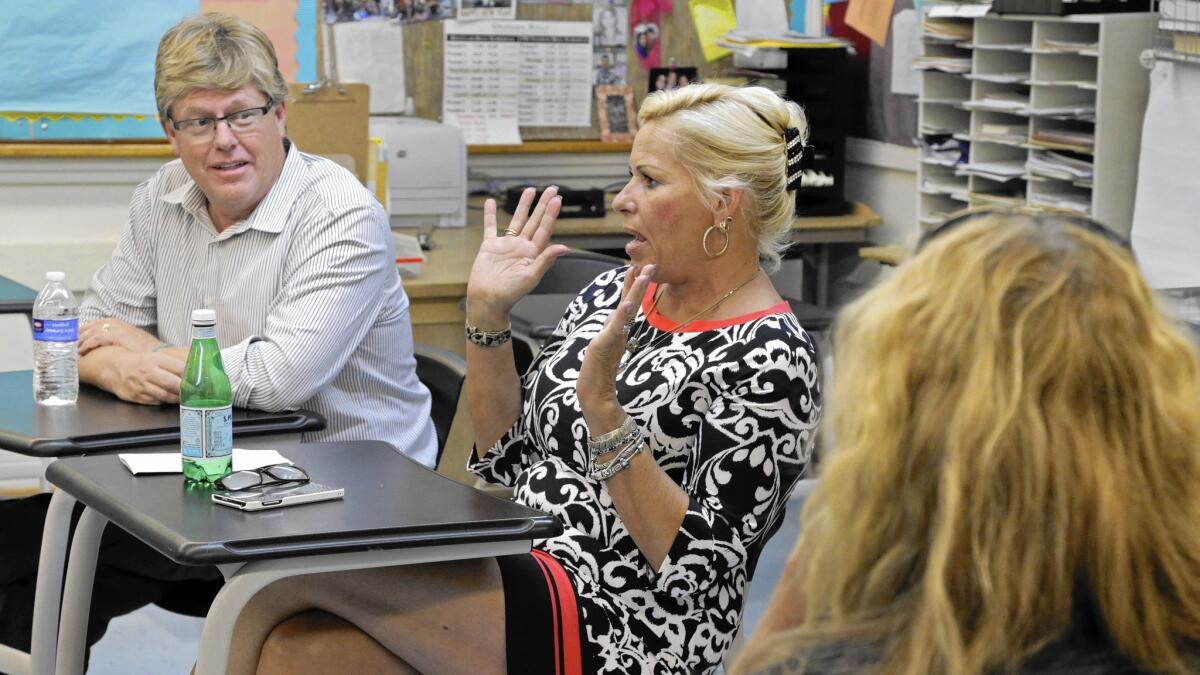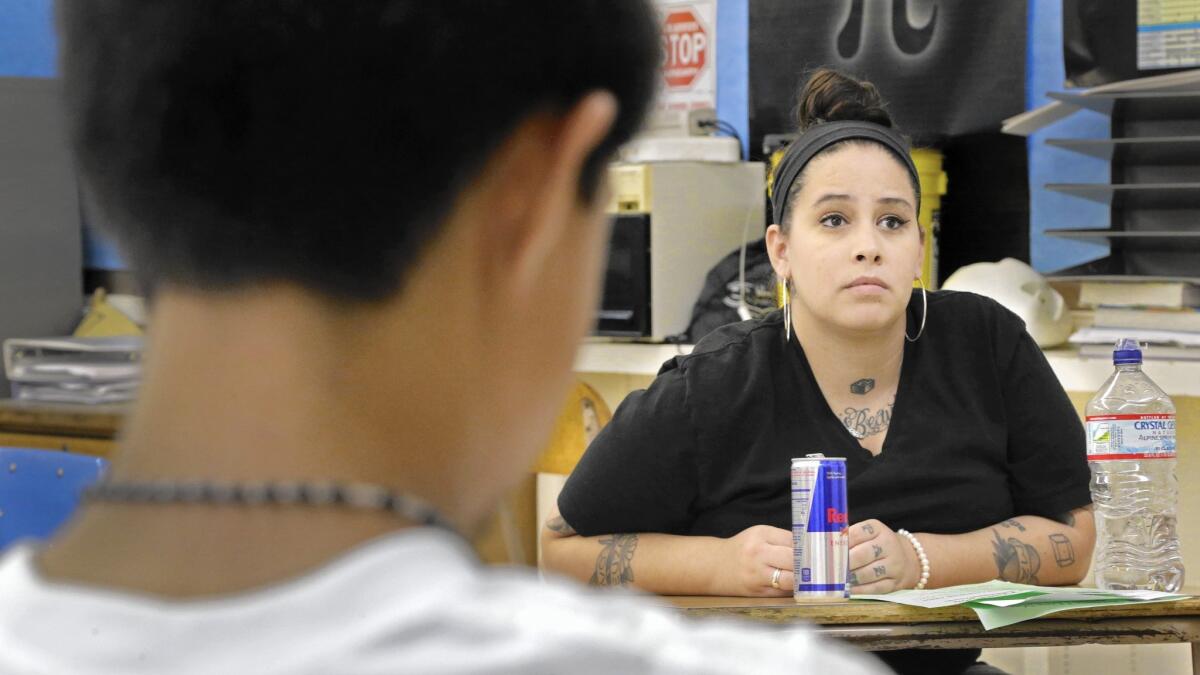‘Professional parents’ in free support group offer aid to troubled families

Parents gather for a support group called Because I Love You at Granada Hills High School in August.
- Share via
On a recent evening in the San Fernando Valley, a couple in crisis poured out their anger and pain over their 19-year-old son.
He got drunk and crashed his car. He has cost his parents $50,000 in college tuition, attorney’s fees and other expenses so far without a whit of gratitude, his father complained. “I’m done with him,” the father said, threatening to move out unless the son does.
But his mom was more forgiving. She had promised her son a college education. She was not yet willing to kick him out of the house. As Dad railed about their son, Mom turned to him and hissed “Keep your mouth shut.”

Parents David and Michelle Hollister weigh in during a discussion.
The group’s co-leader stepped in. “If I were you, I would not be throwing my marriage away over this,” Michelle Hollister told the couple, who asked for anonymity to protect their privacy. “The way I see it, you guys are heading to a divorce if you don’t get [your son] out of the house.”
The intense scene was not a counseling session with professionally trained therapists. It was the regular Tuesday evening gathering of a family support group that has aided 800,000 parents and children in 12 states and Canada over more than 30 years.
All of the session participants in the Granada Hills Charter High School classroom that evening were troubled parents — including Hollister, whose son has struggled with drugs, shoplifting, suicidal impulses and verbal abuse toward his parents.
The group, Because I Love You — BILY for short, draws families of varied ethnic and economic backgrounds from as far away as Orange County and Ventura. Their children’s problems include alcohol and drug addictions — heroin and crystal meth are increasing now — eating disorders, sexual abuse, truancy, anger, violence.
Despite the complex problems, the group’s founder, Dennis Poncher, and his parent leaders have no professional mental health training. But Poncher, 76, calls his team “professional parents” who can offer the compassion and support he said he badly needed three decades ago when he himself was struggling with his children.
In 1983, Poncher learned that his teenage daughter was pregnant. Then she and her younger brother were both kicked out of school after being caught with drugs on campus.
The news blindsided Poncher, especially after losing his wife to illness just months earlier.
“I was in shock. In shock! I knew nothing about parenting,” Poncher said.
He said he planned to kill himself with a bottle of his wife’s Valium until a friend intervened. Instead, Poncher began therapy, enrolled in a self-help program stressing “tough love,” and soon after started BILY, establishing it as a nonprofit in 1986.
Unlike professional family therapy, which can average $100 or more an hour, Poncher’s program is free of charge. The group offers weekly group sessions, individual family meetings, a 10-step program to improve family ties and annual workshops and symposiums.
All of the leaders volunteer their time, and other expenses are supported by an annual Texas hold ‘em fundraiser paired with a silent auction and donations from participants who give what they can afford.
“It’s a gift that I receive and a gift I can pay forward,” Poncher said. “BILY saved my life, and saved the life of my children.”
Hollister, too, said the group offered a lifeline during dark times with her son. She said he was raised with love and plenty of privileges from his parents, who could afford to give him cars and vacations around the world with their combined annual income of $250,000.
But he began smoking marijuana in seventh grade, she said, and spiraled downward. She and her husband shipped him off to Utah for a $400-a-day wilderness therapy program, then to Idaho, where he finally graduated from high school. Problems, however, remain — and BILY has been there every step of the way, she said.
“They offered their knowledge and experiences and really held our hand during the dark days,” Hollister said. “If I didn’t have them, I’d be a certified lunatic.”
The program is so respected that the West Valley Counseling Center in nearby Tarzana refers families there. Teresa Lalicker, one of the center’s licensed marriage and family therapists, said BILY doesn’t replace therapy but helps parents learn from their peers as they share their stories in a confidential environment.
“Community support is really important,” Lalicker said.
But she and Sharon Burnett, the center’s director and licensed marriage and family therapist, said BILY tends to use an older model of treatment — more of a “tough love” approach of setting limits and consequences so as not to enable bad behavior. The center views a child’s issues as a problem of unhealthy family connections, and focuses on healing the entire family as a unit, Burnett said.
“They’re not giving bad advice,” Burnett said. “They’re giving ... incomplete advice.”
Other substance abuse counselors urge parents to attend Al-Anon meetings for family members and also to receive help together.
Poncher said the group’s approach is to “get parents back in control” since too many want to be friends with their children, causing them to lose authority. But he said they never dictate solutions; rather, they offer suggestions based on their own experiences. They include revoking privileges, such as cellphone access and dating, to restrict contact with bad influences, or removing a bedroom door to get children to clean up after themselves.
The group refers serious cases to professional therapists and reports violence or abuse to the Los Angeles County Department of Children and Family Services.
“We don’t tell parents what to do,” Poncher said. “We tell them what we did. They decide what they’re comfortable with, then we help them come up with a plan.”
At one Tuesday gathering, Poncher led nearly 70 parents out of the library, dividing them into groups based on their language, children’s ages and issues. In one room, Kevin Wattles, a lawyer and trained group leader, asked parents to share whether they were in crisis and how severe, on a scale of one to 10, it was.
“I’m, like, on cloud 50,” says one parent. Her child had finally returned from rehabilitation after an arrest and meth addiction and cutting herself.
Another shared her decision to send her child to boarding school: “I miss him terribly. I don’t miss the verbal carnage.”
Before a BILY meeting, parents and children fill out a worksheet noting the highs and lows of home life that week. Then they read one another’s notes.
A group leader read aloud the note from a son to his single mother. No, he hadn’t joined the football team or lived up to his mother’s other expectations. But he unconditionally loves and appreciates her, he wrote.
“She’s been my father and mother for most of my life, and I respect her for that,” her 15-year-old son wrote.
The mother’s sniffle turned into a sob.

Camila Landegger participates in a teen discussion group.
The group also sponsors sessions for teens. On another Tuesday night, teen group leader Camila Landegger closely questioned a youth who showed up with an ankle monitor after a stint in juvenile hall for burglary. The youth told the group he was smoking, drinking and hanging out with friends when he went along with them to steal iPads and other electronic devices from a home.
Landegger pressed him: How would you feel if someone came into your house and stole your stuff? Do you regret it? Would you do it again?
The youth, initially nonchalant about his actions, ended the meeting by saying he would not steal again and hoped to go to college and get a good job. “I don’t want to sell drugs that mess up people’s health,” he said.
By evening’s end, not all problems were solved. But possible solutions had been laid out. The man who had threatened to move out of the house if his son stayed, for instance, was somewhat mollified after his wife agreed to consider having their son stay with her mother. The man has a new job in the Bay Area, easing family tensions somewhat.
They would be back to another BILY meeting again.
Twitter: @teresawatanabe
Times staff writer Sara Hayden contributed to this report.
ALSO
Get out those fall clothes, L.A.: Temperatures could drop by 20 degrees
Nearly 500 arrested at electronic music festivals in Pomona, San Bernardino
Deterioration of public school arts programs has been particularly jarring in L.A.
More to Read
Sign up for Essential California
The most important California stories and recommendations in your inbox every morning.
You may occasionally receive promotional content from the Los Angeles Times.












